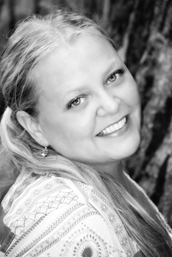A guest post by Kelli Ann Morgan.

If you are anything like me, you like to take on challenges that will push you to do more—to be more—than you have ever done or been before. Every year, a small group of wonderful writers and I get together to report on our previous year’s goals and to set new ones for the upcoming year over food and lively conversation.
During this year’s event, I set up a list of twenty-three specific goals that I wanted to accomplish throughout this year and placed each one on its own notecard to be displayed on the corkboard above my desk in my office. (Yes, I do realize that twenty-three is an insane number of goals, but I would rather shoot for the stars only to lasso the moon than to shoot for the mailbox and barely make it out my front door.) And believe it or not, my goals are not amongst the craziest of the goals some writers set.
Just like anything, your goals need to be tended. Nurtured even. Summer tends to mark the midpoint of the year and is the perfect time to look over your goals and make any necessary changes to get back on track. I use a simple three-step method I call the Triple R Process: Reevaluating, Reorganizing, and Recommitting to Your Goals. By following the Triple R Process, you will enjoy a more productive and happier year.
REEVALUATE
The first step in the Triple R Process is to reevaluate the goals that you set at the beginning of the year. Tug them down off your office wall or pull out the notebook you have them written in and look at them one by one. You’ve had six months to work on your goals. What worked? What didn’t? Ask yourself if they still fit as goals with SMARTS.
NOTE: When setting my goals at the beginning of the year, I try to keep in mind the familiar SMART method with one exception. Many of your may already know how to set SMART goals and so I will not touch on that—other than to define what SMART stands for. Your goals should be: Specific, Measureable, Attainable, Relevant, and Time-bound. My exception rule is to include at least one “Shoot for the Stars” goal. Therefore, they are goals with SMARTS. We all need a little latitude for attitude.
Life has a habit of throwing curveballs in your direction and that means goals or ideas that were once applicable or relevant may no longer fit into the overall vision you will now have for your immediate career. It is okay to change your goals. Let me repeat that. IT IS OKAY TO CHANGE YOUR GOALS. In fact, it would be counterproductive if they need to be changed and you do not make adjustments.
Reevaluating your goals and making necessary changes does not mean you have failed. It means that you have enough SMARTS to actively groom yourself and your career in an ever-changing industry. You do need to hold yourself accountable. You do need to work on them every day. You do need to…DO something.
REORGANIZE
The second step in the midpoint Triple R Process is to reorganize the goals that made it through the reevaluation step. You will also reorganize your workspace and your mind to be more positive and forward thinking. This step is very important—especially if you have more than one goal you are trying to accomplish. Learning how to prioritize your goals based on your experience over the last six months and understanding how to modify your approach to them is vital to your success. Take the time to make the necessary preparations to be successful. You may have learned that there is more, or a different type, of groundwork needed to be successful in one goal or another.
Next, make a schedule. This does not have to be a detailed, down-to-the-minute schedule, but a basic idea of what you will accomplish on any given day or in what month you will work on a or complete a specific goal. Reorganizing your goals will help you discover where your priorities lie. Reorganizing is different for everyone. Make a chart, goal cards, or some type of visual that you can display in a prominent place in your workspace as a reminder of what you are trying to accomplish. These reminders will help you keep focused on days things aren’t going so well.
RECOMMIT
The third and final step in the Triple R Process is to recommit to the goals that have made it through the reevaluation and reorganization steps. Remember, it’s all about the big picture. 2+2 does not equal 3 no matter how creative you get. Every goal should fit into your master plan and if you want your plan to be a success, you must commit to the goals that will get you there. Believe in the goals that you set. Know your limitations and strive to understand your strengths. Use them to recommit to the big picture.
Work doesn’t have to be miserable. Right now is an AMAZING time to be a writer with many opportunities both here and on the horizon. Whether you are just starting out, a seasoned best-selling author, or somewhere in between, the need to commit to your work is the same. Every step of the journey is worth taking if you look for the lessons and take time to appreciate every moment.
Look at your goals and recommit to achieve them. Find someone to report your progress to. Hold yourself accountable, but never give up. The road will not always be easy, but success is also found in the journey not just the destination. Do whatever it takes to do more. Be more.
It may sound like a lot of work, but it is all about perspective. You can achieve great things by starting out small and dreaming big. Shakespeare wrote, “Be not afraid of greatness: some are born great, some achieve greatness, and some have greatness thrust upon them.” It is up to you. Reevaluate. Reorganize. Recommit. Then celebrate. Celebrate every one of your successes—great or small. You deserve it. Take the time to use my Triple R Process and watch your dreams come alive before your eyes. You’ll get out of it what you want to. I’ll see you out among the stars!
Kelli Ann Morgan Bio:
KELLI ANN MORGAN recognized a passion for writing at a very young age and since that time has devoted herself to creativity of all sorts. She also moonlights as a Creative Designer – creating covers and more for other authors- and works as a photographer, jewelry designer, painter, and motivational speaker. Kelli Ann graduated Summa Cum Laude with her degree in Business and is the owner of Inspire Creative Services. She is a long-time member of the Romance Writers of America and was president of her local chapter in 2009. Her love of and talent for writing have opened many doors for her and she continues to look for new and exciting opportunities to teach, inspire, and entertain. Kelli Ann loves to hear from her readers. Visit her at www.kelliannmorgan.com.







